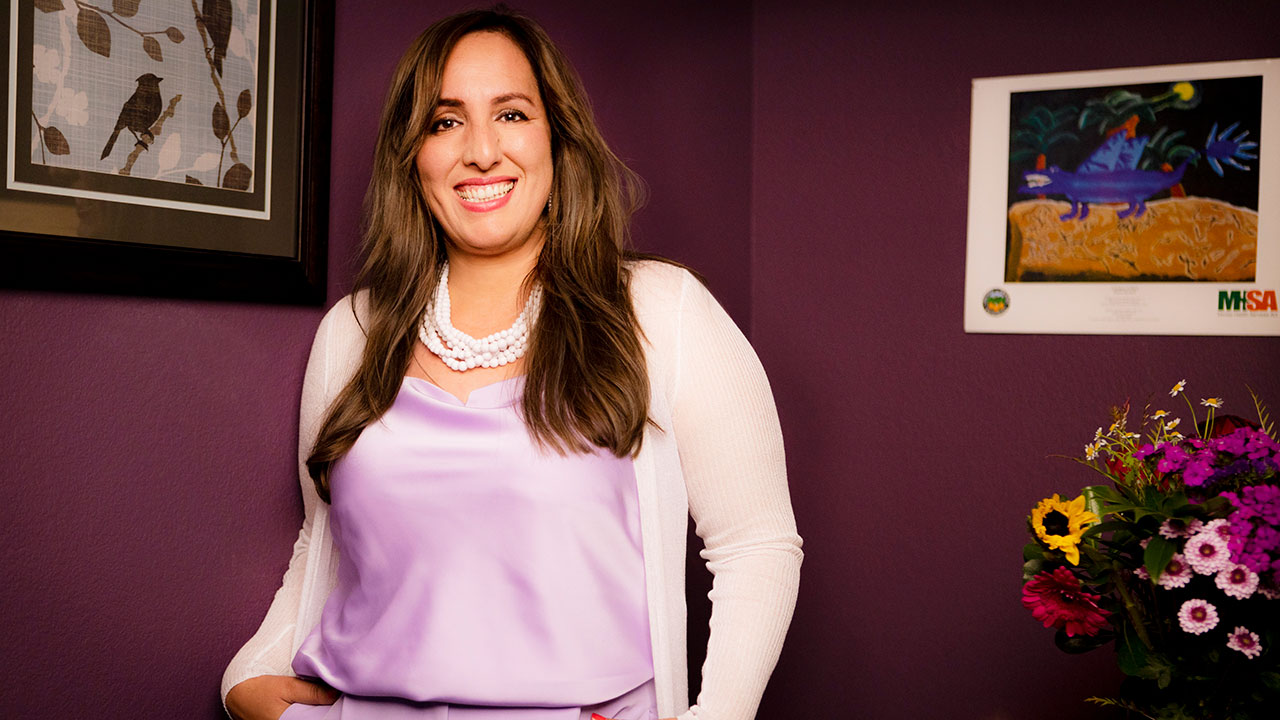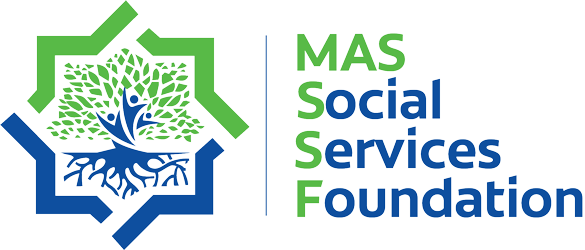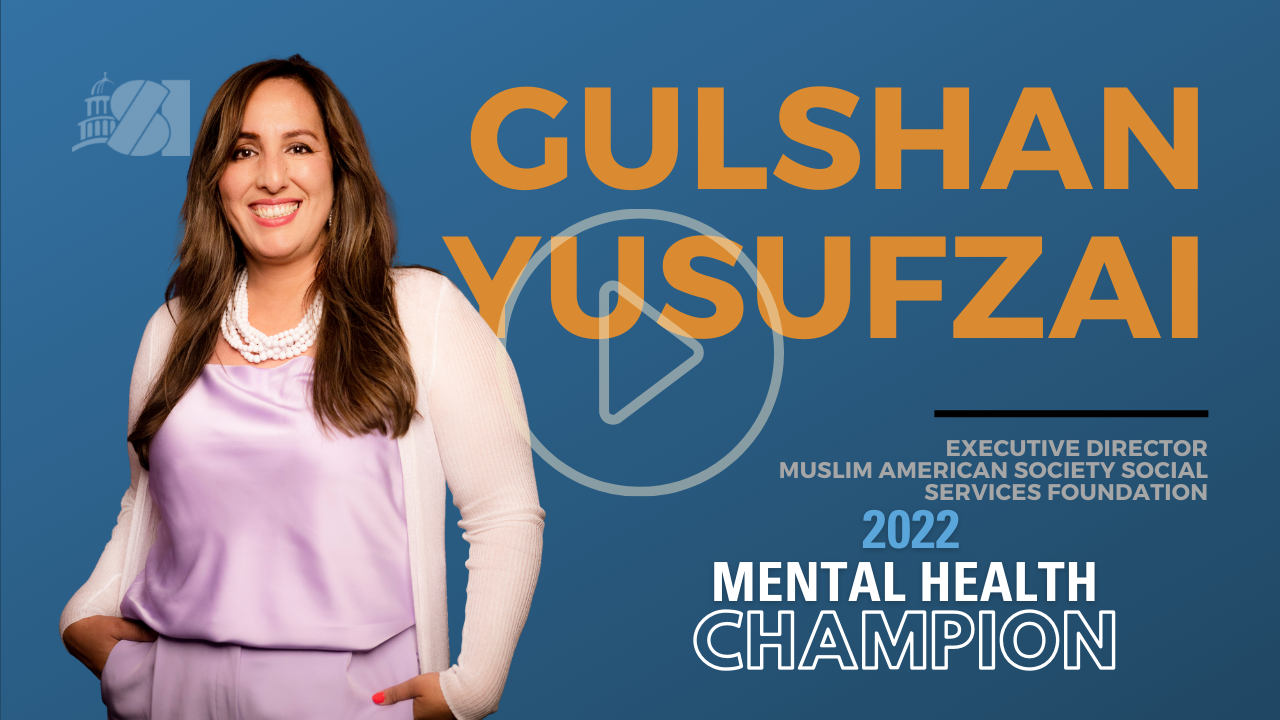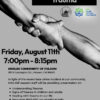2022 MENTAL HEALTH CHAMPION
Northern California’s Muslim community has a mental health champion in this Afghanistan refugee
By Dorsey Griffith – Steinberg Institute
As refugee life goes, Gulshan Yusufzai’s early years in Pakistan after fleeing Afghanistan in the wake of the 1979 Russian invasion were relatively happy. Her parents and her seven siblings survived the dangerous journey and they lived in a house, not a tent, which her family shared with uncles, aunts, and their children.
“For a child, it was party time,” she says. “I couldn’t read, but I always kept very busy. I made activities up. My uncle made dolls for us. I remember one was very beautiful and chubby, made of feathers and cloth with sewn-on eyes.”
But leaving everything behind in Afghanistan, spending seven years in the camp, and finally adjusting to harsh new realities in America took a toll on Yusufzai and her family, with some members suffering crippling mental health problems. Fortunately for Yusufzai, she had an exceptionally supportive teacher at her West Sacramento elementary school, discovered books and eventually forged a path forward. Her journey would take her to a place where she could provide critical support to other Sacramento-area Muslims from around the world.
Today, Yusufzai, now 42, is executive director of the Muslim American Society Social Services Foundation (MAS-SSF), which she has developed into a unique and comprehensive agency serving the social and mental health needs of Sacramento’s large and diverse Muslim community.
“Although there is such a large number of Muslims in Sacramento and a lot of mosques, families are still having a lot of challenges,” Yusufzai says. “The divorce rate is going up, and there are suicides and family issues. The community wanted a place where people could come and talk and feel safe. For me, it was everything I had seen in my life.”

Yusufzai was 2 when she arrived in Pakistan, and although surrounded by a loving family at home, her young eyes witnessed some gruesome scenes, including various human remains strewn in a graveyard behind her home. When she was 5, she discovered her uncle, who struggled with addiction and mental health issues addicted and mentally ill uncle hanging by a rope in their home. After emigrating to the United States when she was 9, Yusufzai’s family landed in a gang-riddled West Sacramento neighborhood rife with gang activity, where she once watched as a man was thrown from a moving car, shot in the face, and run over, all within feet of her own father who was watering the lawn.
Her father applied to a university in pursuit of a doctoral degree. Still, he wasn’t accepted and failed to land a job in agriculture, an area he had studied in the U.S. while earning a master’s degree years earlier. Eventually, Yusufzai says, he quit trying.
Yusufzai believes all refugee families suffer from trauma, and the resulting mental health issues are often mislabeled or buried – hidden from the outside because of stigma and the practical consequences of divulging the truth.
Although there is such a large number of Muslims in Sacramento and a lot of mosques, families are still having a lot of challenges. … The community wanted a place where people could come and talk and feel safe. For me, it was everything I had seen in my life.
Gulshan Yusufzai
“When you are raised in two cultures, you are going through so many challenges,” she says. “Where do you belong? What is your place? You spend most of your time struggling. Eventually, without access or opportunities to belong to a culture, it messes with your identity, and that affects your confidence and your success.”
Gulshan Yusufzai pursued a degree at UC Davis
After high school, Yusufzai pursued a degree at UC Davis in political science. Although a brilliant student, she also suffered a mental health challenge and nearly gave up. She was saved by a job opportunity in the mental health department of what is now called the California Institute of Behavioral Health Solutions. There she began to understand what she had lived through as a child.
That job would next lead to a position at the California Institute for Mental Health and, four years later, a pivotal post with the California Network of Mental Health Clients, a nonprofit advocacy program for the mental health client/consumer community. There she worked with people who had been through their own mental health challenges and were providing peer support to others.
“I got to see how who had been in so much pain moving toward recovery,” she says. “These people were so honest, raw, and real.” She dreamed of creating the same system of support for the Muslim community.
MAS-SSF gave her that opportunity. In 2013, when she was hired as executive director, it was run by volunteers; today, it has a permanent staff of 14 and 68 peer-support specialists. With funding from city, county, state, and federal sources, Yusufzai has built a broad portfolio of community service offerings, including the nation’s first peer-support program for Muslims.
Youth and adults from the Middle East, South Asia, and North Africa are welcome to receive culturally appropriate social services, training, and education in five languages. The center opens its doors to all.
“My hope was to have a system where anyone can come in and get access to services, feel comfortable, speak in their own language, and apply the peer model to the Muslim community,” she says. “That is what we are doing. I really believed in this place, and I still do.”







